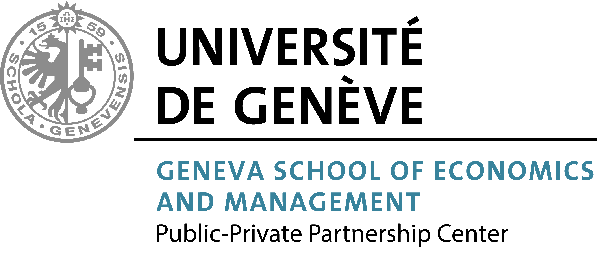We encourage students to analyze topics linked to PPPs based on a theoretical and empirical basis in their MBA, Master, and Bachelor Thesis (GSEM, University of Geneva).
For the conditions and guidelines please check probst.unige.ch.
The following topics might be of interest for the Center (not exhaustive, further ideas welcome):
-How do PPPs get started?
-How are PPPs structured and coordinated in view of the participation of several organizations?
-What specific leadership skills do cross-sector projects need? What can corporate leaders learn from such a setting?
-Change management and PPPs: How do PPPs change companies?
-Overview of the organizational exit strategy literature and application to the setting of collaborative PPPs
Completed MBA, Master, and Bachelor Projects:
- «Cross-Sector Social Partnerships between Nonprofits and Public Institutions: Governance and Outcomes», Ophélie POIRIER, Bachelor Thesis, 2016
- «Stakeholder Management as a Success Factor in Cross-Sector Partnerships' Implementation: Case Study of a UNIDO Textile and Garment Industry Development Project in Armenia», Ani ATABEKYAN, Master Thesis, 2016
- «From Care and Maintenance to Self-Reliance: Sustainable Business Model Connecting Malian Refugee Artisans to Swiss Markets», Shalini MEHAN, Boglarka LAZA, and Inna FINKHMAN, MBA Thesis, 2015
- «Public-Private Partnerships for Development - The Balance of Global Integration and Local Responsiveness. The Case of GAIN and Grow Africa», Alessio DEVITO and Stéphane FORMENTI, Master Thesis, 2015
- «The role of non-for-profit organizations in growth strategy. Case study: The World Trade Center Geneva and the Swiss market», Leona BRNOVA, 2013
- «Public Private Partnerships in the UN organizations. A study on PPPs of the International Trade Center», Chao HAN, 2013
- «Positioning a nonprofit organization with and against a cross-sector partnership – A concept for the Geneva based Antinea Foundation», Fabian MUNZ, 2013
- «Investigating the Management Paradox of Communities of Practice: The Case of the World Economic Forum's Global Agenda Councils», Jessica SHANNON, 2013
